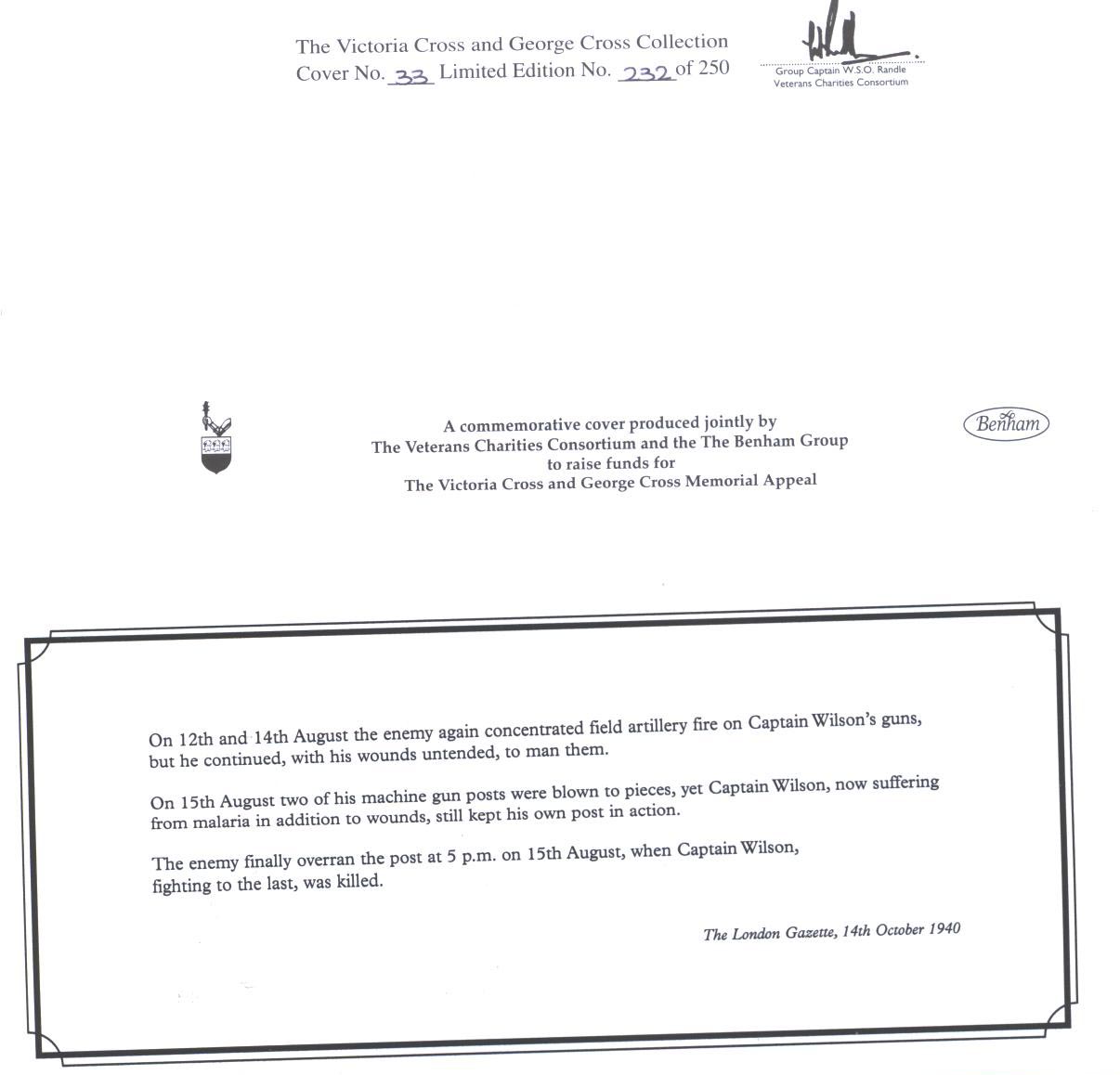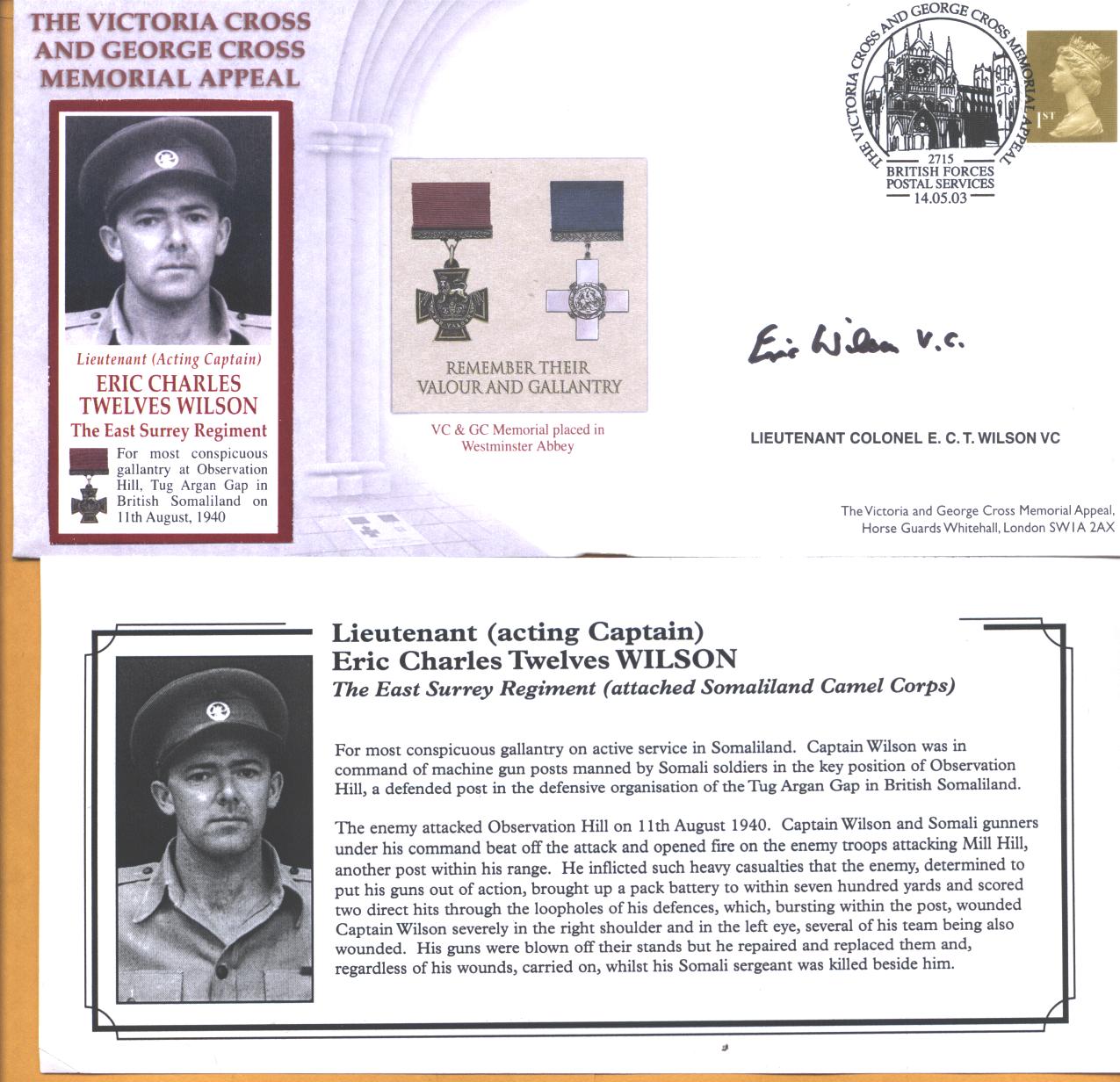

|
WILSON Eric Charles Twelves
Eric Charles Twelves Wilson
Lieutenant Colonel Eric Charles Twelves Wilson VC (2 October 1912 – 23 December 2008) was an English army officer and colonial administrator. He received the Victoria Cross, the highest and most prestigious award for gallantry in the face of the enemy that can be awarded to British and Commonwealth forces. Until his death, he was one of only ten Victoria Cross recipients alive. He was the last surviving British Army recipient of World War II as well as being the earliest and oldest recipient. His VC is on display in the Lord Ashcroft Gallery at the Imperial War Museum, London.
Wilson was commissioned as a second lieutenant in The East Surrey Regiment on 2 February 1933. He was promoted to the rank of lieutenant in 1936 and was seconded to the 2nd (Nyasaland) Battalion The King's African Rifles in 1937 serving in East Africa, where he learned to speak Nyanja. He was then seconded to The Somaliland Camel Corps in 1939.
In August 1940, Wilson was 27-years-old, and by then an acting captain attached to the Somaliland Camel Corps, when Italian forces commanded by General Guglielmo Nasi invaded British Somaliland (now Somalia). During the Italian conquest of British Somaliland the heavily outnumbered British-led forces made their stand on the hills around Tug Argan. During this battle, from 11 August 1940 to 15 August 1940 at Observation Hill, Captain Wilson kept a Vickers machine-gun post in action in spite of being wounded and suffering from malaria. Some of his guns were blown to pieces by the enemy's field artillery fire, and his spectacles were smashed. He was wounded in the right shoulder and left eye, and he was assumed to have been killed. For his actions, likened in the Daily Sketch to another Rorke's Drift, he was awarded the Victoria Cross. He had however had been captured by the Italians.
He has the rare distinction of being mistakenly awarded a "posthumous" VC, announced in the London Gazette on 16 October 1940. At the time the award was made he was believed to be missing in action, presumed dead. An official report in The Times in 16 October indicated that he has survived, but another captured officer was surprised to find the "late" Captain Wilson still alive in a POW camp in Eritrea.
When the Italian forces in East Africa surrendered following the East African Campaign Wilson was released from captivity in 1941. He returned to England and received his Victoria Cross at Buckingham Palace in July 1942. With his captain's rank made permanent in 1941, and serving as a temporary major, he served as adjutant of the Long Range Desert Group and then as second in command of the 11th (Kenyan) King's African Rifles, part of the 25th East African Brigade in 11th East African Division, in the Burma Campaign. Having contracted scrub typhus he was hospitalised for two months and then returned to East Africa to command an infantry training establishment at Jinja in Uganda. He was promoted to acting lieutenant-colonel in June 1945 and was seconded to The Northern Rhodesian Regiment in 1946. He retired from the Army in 1949 and although at this time his permanent rank was major, he was granted the honorary rank of lieutenant-colonel.
Victoria Cross Citation
The formal citation for Wilson's VC, published in the London Gazette in October 1940 when he was still presumed dead, reads:
The KING has been pleased to approve of the award of The Victoria Cross to :
Lieutenant (acting Captain) Eric Charles Twelves Wilson, The East Surrey Regiment (attached Somaliland Camel Corps).
For most conspicuous gallantry on active service in Somaliland. Captain Wilson was in command of machine-gun posts manned by Somali soldiers in the key position of Observation Hill, a defended post in the defensive organisation of the Tug Argan Gap in British Somaliland. The enemy attacked Observation Hill on August 11th, 1940. Captain Wilson and Somali gunners under his command beat off the attack and opened fire on the enemy troops attacking Mill Hill, another post within his range. He inflicted such heavy casualties that the enemy, determined to put his guns out of action, brought up a pack battery to within seven hundred yards, and scored two direct hits through the loopholes of his defences, which, bursting within the post, wounded Captain Wilson severely in the right shoulder and in the left eye, several of his team being also wounded. His guns were blown off their stands but he repaired and replaced them and, regardless of his wounds, carried on, whilst his Somali sergeant was killed beside him. On August 12th and 14th the enemy again concentrated field artillery fire on Captain Wilson's guns, but he continued, with his wounds untended, to man them. On August 15th two of his machine-gun posts were blown to pieces, yet Captain Wilson, now suffering from malaria in addition to wounds, still kept his own post in action. The enemy finally over-ran the post at 5 p.m. on the 15th August when Captain Wilson, fighting to the last, was killed.
From Wikipedia, the free encyclopedia
Signed Postal Cover
Price: $40.00
Please contact us before ordering to confirm availability and shipping costs.
Buy now with your credit card
other ways to buy
|


